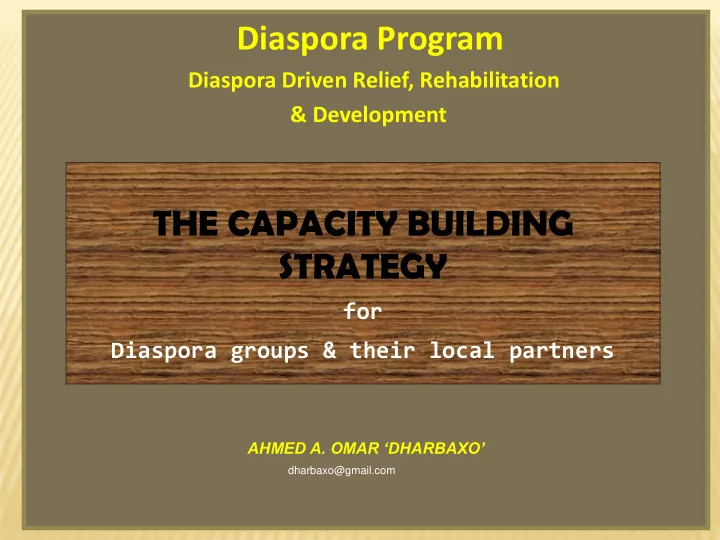

Diaspora Program Diaspora Driven Relief, Rehabilitation & Development THE CAPACITY BUILDING STRATEGY for Diaspora groups & their local partners AHMED A. OMAR ‘DHARBAXO’ dharbaxo@gmail.com
The present capacity building strategy It addresses the specific challenges that Diaspora groups and their local partners suffer in the planning, implementation and monitoring of their projects. It is not intended to strengthen the organizational development capacity of the Diaspora partners, nor their local partners.
CAPACITY STATUS IDENTIFIED DURING PCM WORKSHOPS IN THE PILOT PHASE IN 2011 - All groups had difficulties of developing LFA. - Lack of adequate risk assessment/management skills. - Poor record keeping. - Groups had no capacity building strategies/plans. - Inadequate report writing skills. - Limited understanding of active community participation. - Groups not considered the DO NO HARM concept. - No proper stake holder’s analyses carried out. - Difficulties in budgeting and financial management procedures. - Lack of effective planning skills - Problem with developing vision, goal, objectives. - Most could not identify SMART indicators. - Very poor participatory appraisal in needs assessment. - Unclear project sustainability plans. - Insufficient skills of M&E
PRE-APPLICATION POST-APPLICATION PHASE PHASE Application Coaching & PCM- I Pre-application D Coaching ’B’ Mentoring PCM - II Seminar C Review and Monitoring B Application Coaching ’A’ CB Assessment PRA Workshop L C PCM Training CB Monitoring On-job training B
Objective 1 Developed capacity of the Diaspora groups on project designing Pre-application seminar Application coaching, Application mentoring
Objective 2 Enhanced Diaspora group’s capacity to implement and monitor high impact projects. PCM – I Coaching and Mentoring PCM – II Individual feedback sessions Review Workshops
Objective 3 Improved Local Partners’ skills of managing projects in collaboration with Diaspora organizations; adopting participatory development concepts. SWOT analyze PRA training Risk assessment training PCM at the field Monitoring/Review Community engagement monitoring
CHAL HALLENG LENGES ES • Some Diaspora partners and local partners nominated shadow members to participate the capacity building events. • During coaching: Groups provide insufficient information or data. • Knowledge gained may not share to other members of the group. •Some do not know what they ‘do not know’. • Some individuals are not keen to learn and have not commitment. • Some groups have no clear role and responsibilities for their members to decide who attends the training opportunities. • Some may never have developed/implemented a project, neither in Denmark nor in Somalia/Afghanistan. • Poor knowledge or lack of English language – which might mean that groups have ideas but can’t put them on paper. •Some organizations/groups’ culture does not encourage learning or taking initiatives or seeking to make improvements . • Registering but not attending
CAPACITY BUILDING DEFINITION Capacity building is an ongoing process through which individuals, groups, organizations and societies enhance their ability to identify and meet development challenges . Capacity building is also defined as the empowerment which encompasses the ability, will and skills to initiate, plan, manage, undertake, organise, budget, monitor/supervise and evaluate project activities .
GROUP ASSIGNMENT ‘1’ Empowerment of Diaspora groups and their local partners’ capacity – Review current capacity building strategy and explore what could improve it in terms of: -Methodology -Content -Time frame -Frequency
GROUP ASSIGNMENT ‘2’ In addition to workshops and training, what should capacity building be pursued? Consider informal approaches like networking and information sharing, visits to similar projects, feasibility studies, advocacy skills, developing policy framework, technology needed, forming clubs, refresh courses, organizing events, continuous learning, commitment and motivations, …… .
GROUP ASSIGNMENT ‘3’ What can be done to strengthen the organizational development capacity of the Diaspora groups and their local partners? Reflect on areas of governance, management, membership, legitimacy, service delivery, …
Recommend
More recommend